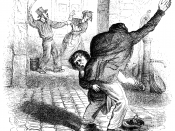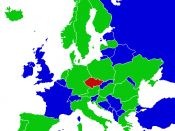Corporal punishment (CP) is the archaic method of curbing unsuitable behaviour by deliberately inflicting pain without injury. CP normally goes by the names: "beating," "hitting," "spanking," "paddling," "swatting," and "caning." (Benatar 1) Originating in Europe for minor judicial and educational misconducts in the 11th century, CP was a cruel and abusive way of correcting improper behaviour. CP principles were no different than classical conditioning, with pain as the stimulus. CP was far the most popular form of punishment until English philosopher John Locke stirred up some controversy with his paper, Some Thoughts Concerning Education around the late 1700s. Locke questioned the idea of corporal punishment being central to education, with emphasis on educational institutions in place of nurturing parents to bring up proper, law-abiding citizens. This brought a whole new view to CP, one the world never saw before. Subsequently after much debate, Poland banned all forms of CP in 1783, hoping to bring worldwide attention and reform to this unforeseen problem.
Overtime, psychologists completed many studies on CP and it's harmful effects. After much deliberation and debate, the consensus was CP is greatly more harmful than first thought. (Benatar 1*) CP provides no edge over any other non-abusive disciplinary strategy in existence in regards to responsiveness and deterrence from misconducts. Therefore, alternate measures should be sought, tried and tested to replace CP as a form of corrective quality.
A fundamental reason against CP no distinction and boundary between how much pain constitutes corrective behaviour from abuse. Without this fine line, (and a method in which to accurately measure pain inflicted in an ethical custom) CP is seen as violation to human rights internationally. CP is also considered sexual abuse if the afflicted area is the buttock. This reaction has brought forth the notion to ban CP principles indefinitely in all industrialized countries and beyond. (UN "Conventions on the Rights of a Child")
"... relatively ineffective, is degrading, is psychologically damaging,
stems from and causes sexual deviance, teaches the wrong lesson,
arises from and causes poor relationships between teachers
(or parents) and children; and does not deter the child from acting
in such a manner again." (Benatar 2)
Some argue that with proper use and dosage, CP is an effective and sufficient method of dealing with inappropriate behaviour. (Gershoff) In reality, psychologists have proven no matter the amount CP is harmful in the long run. (Wikipedia) The latter is further authenticated by a study in Sweden where grandparents who had exercised CP on their children gave the future-parents a greater tendency to exact CP on their own children in forms of retribution and revenge. (Benatar 2a)
Psychologically, CP can lead to training children to use violence as a means of resolving conflicts or correcting behaviour, and creating a sense of fear between the child and parent. Bullying, spousal abuse, lower intelligence levels and insufficient means of dealing with personal problems have all been linked to CP. (Goldman) With time, the abuse can become so great it may trigger development of psychological abnormalities like reactive attachment disorder, multiple personality disorder and others. (Hall)
Physical harm can be an unwanted yet very possible result of CP. Depending on the method and degree of CP is implicated: scars, lacerations, bruising, and broken bones can become likely results of some forms of CP. Being violent in nature, CP is not meant to be physically injuring but carries obvious risk to whoever commences such forms of punishment.
The child can suffer the most emotionally through exposure to CP. When a child is disciplined using CP, the child can form a negative association not only with the wrongdoing committed (intended result), but the person actuating the punitive measures (non-intended result). The child could start to resent, hate and hold grudges against the individual that could manifest itself in highly unhealthy means later. These manifestations go on to include abusive personality in mental, physical and emotional ways.
Others dispute the fact there is no alternative to CP that is an effective and staunch way of getting the point across. In fact there are a few methods other than CP that deals with juvenile disobedience, and have been proven to have some positive effect on behaviours.
A likely example of CP put into practice in present times is spanking. Spanking has been proven to heighten the probability of physical injury to an infant less than 18 months of age. Not only is the child at risk of physical harm, there is little chance the child will properly determine what he or she did wrong. (Goldman) Children who are abused with CP are also highly likely to "physically attack siblings, develop less adequately-developed consciences, experience adult depression, and physically attack a spouse as an adult" (Goldman)
Alternative methods of dealing with juvenile disobedience range from severe to normal. Depending on the psychological, mental, and physical state of the child, different approaches might be applied. These treatments do not have the long-lasting effects of abuse or violence as does CP and still effective enough to teach the child what's wrong from right.
"Training" is a good example of such safe-alternatives to spanking. Even though based of spanking, "training" constitutes of "a gentle slap, flick with a finger, or light stroke with a switch to enforce the vocal command (If not obeyed the first time the command was issued)." Training, when done in a "calmly and lovingly [way], right at the site of the disobedience" reduces further use of a harsher punishment to correct behaviour. (Wikipedia)
Other extreme cases may require more drastic measures to be an effective alternative to CP. Depending on the individual, the child could suffer from a psychological problem that requires medication or therapy, or possesses a defect in which the child may or may not be able to understand what is right and what is wrong. These extreme cases require special medicinal attention catered to the individuals needs. Cognitive re-programming/re-training, shock therapy or other methods of medicinal practice may be used. Regardless of the severity, these two options serve as much better substitutions of CP.
With being abusive and detrimental to society, CP is not the way of the future for disciplining children anywhere in the world. There are many other alternatives to correcting improper behaviour without having to resort to violence and contributing to societies acceptance of violence through corporal punishment. With pressures from lobbyist groups, and nations, together through global collective agreement, corporal punishment will become just a page in history. Violence will become more subdued, a significant decrease in domestic disputes/abuses across the globe will be prevalent, and fewer children will choose to become bullies at school. Society will have one less thing to worry about.


